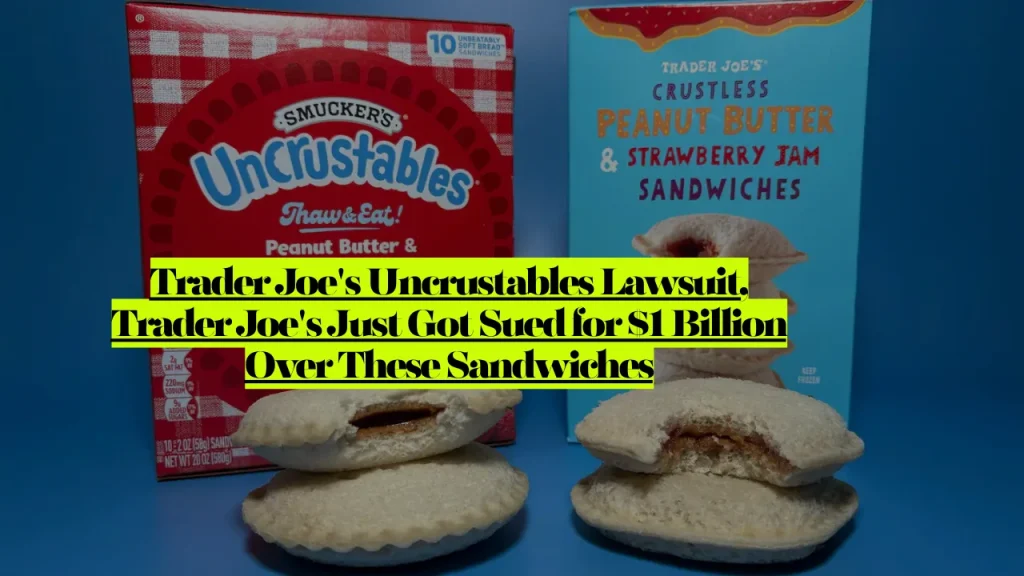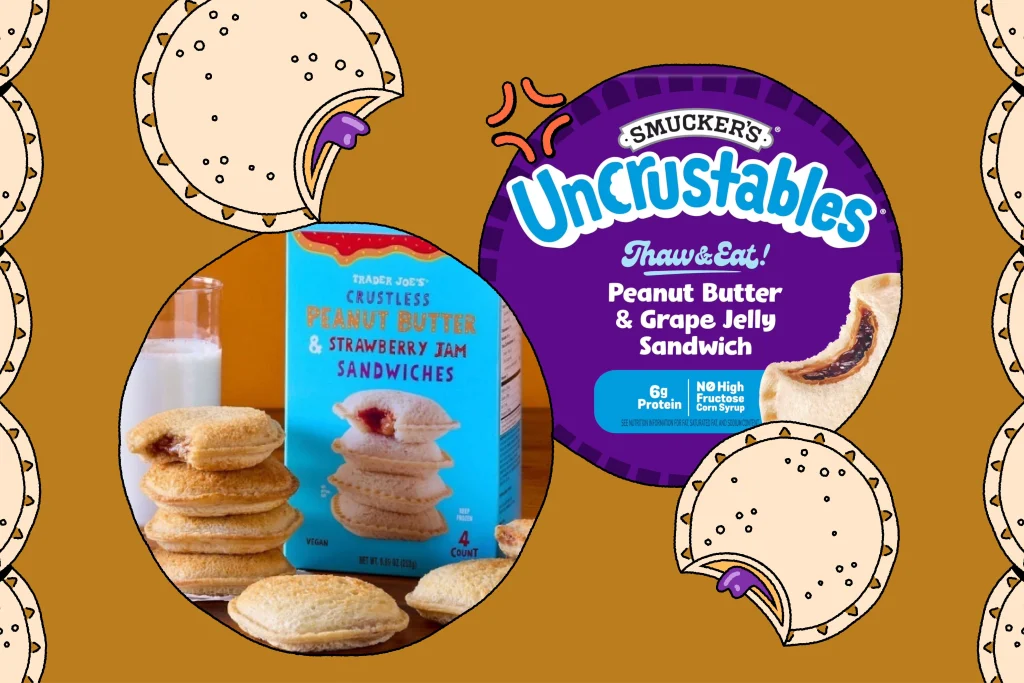Trader Joe’s Uncrustables Lawsuit, Trader Joe’s Just Got Sued for $1 Billion Over These Sandwiches
The Trader Joe’s Uncrustables lawsuit has shocked grocery shoppers nationwide. J.M. Smucker Company filed a federal lawsuit on October 14, 2025, in Ohio, accusing Trader Joe’s of selling frozen peanut butter and jelly sandwiches that copy the distinctive design and packaging of Smucker’s billion-dollar Uncrustables brand. This legal battle raises serious questions about how far companies can go to protect their product designs.
What’s Behind the Trader Joe’s Uncrustables Lawsuit?
The lawsuit claims Trader Joe’s sandwiches are “an obvious copycat” that infringes on Smucker’s trademarks. The Ohio-based food giant isn’t just concerned about competition—they’re fighting to protect intellectual property they spent over a billion dollars developing.
Here’s what Smucker’s takes issue with:
- The round, crimped edges that create Uncrustables’ signature pie-like appearance
- Blue packaging similar to Smucker’s trademarked Uncrustables branding
- Bite-mark graphics on the box showing a sandwich with filling exposed
- Overall product presentation that allegedly confuses consumers
Smucker’s stated in court documents that while they don’t object to competitors selling crustless sandwiches, they cannot allow others to use their valuable intellectual property.
The Billion-Dollar Brand at Stake
Uncrustables were invented by two friends in 1996 in Fergus Falls, Minnesota. Smucker acquired their company in 1998 and secured patents for a “sealed, crustless sandwich” in 1999. But creating the product wasn’t easy.
Over the last 20 years, Smucker invested more than $1 billion perfecting Uncrustables’ stretchy bread and developing new flavors beyond peanut butter and jelly, including chocolate and hazelnut varieties.
The investment paid off. Uncrustables now produces approximately 1.5 billion units annually and is well on its way to becoming a billion-dollar brand.
Consumer Confusion: The Legal Heart of the Matter
The lawsuit centers on a legal concept called “likelihood of confusion.” Under the Lanham Act, trademark law protects a trademark owner’s exclusive right when use by another would likely cause consumer confusion about the source or origin of goods.
Smucker claims consumers are already being deceived, citing social media posts where people mistakenly believe Trader Joe’s contracted with Smucker to produce the sandwiches under a private label. This type of marketplace confusion is exactly what trademark law aims to prevent.
Related article: Invisalign Maker SmileDirectClub Class Action Lawsuit, 31.75M Invisalign Settlement Deadline in Days – Are You Missing Out on Your Money?

How Courts Determine Trademark Infringement
To prove trademark infringement under the Lanham Act, plaintiffs must demonstrate they have a valid mark entitled to protection and that the defendant’s use of a similar mark causes a likelihood of confusion.
Courts consider multiple factors:
- Similarity between the competing marks
- Similarity between the products
- Defendant’s intent
- Evidence of actual consumer confusion
- Sophistication of consumers
- Strength and recognition of the trademark
What Smucker’s Wants From the Court
Smucker is seeking restitution from Trader Joe’s and wants a judge to require Trader Joe’s to deliver all products and packaging to Smucker for destruction. These remedies are standard in trademark infringement cases.
The lawsuit accuses Trader Joe’s of trademark infringement, trademark dilution, unfair competition, false designation of origin, and deceptive trade practices.
Legal Expert Perspectives
Michael Kelber, chair of the intellectual property group at Neal Gerber Eisenberg law firm, noted that Smucker’s registered trademarks will help bolster its argument. However, the case isn’t cut and dry.
Trader Joe’s might argue the crimping is simply functional rather than something that can be trademarked, or that their sandwiches appear more square than Uncrustables, making the shape distinguishable.
One of the biggest issues in cases like this is whether the copycat product actually deceives consumers. The evidence Smucker’s presents about social media confusion will be critical.
Why This Case Matters Beyond PB&J
This isn’t Smucker’s first rodeo. In 2022, the company sent a cease and desist letter to Minnesota company Gallant Tiger for making upscale crustless peanut butter and jelly sandwiches with crimped edges.
Legal experts say trademark cases often wind up being settled because neither company wants an expensive trial. But the outcome could set important precedents.
The lawsuit comes months after Mondelez International filed similar claims against Aldi, alleging their store-brand packaging too closely resembles Mondelez brands like Chips Ahoy, Wheat Thins, and Oreos. These cases signal growing concern about store-brand products that push trademark boundaries.
Consumer Protection and Food Labeling Implications
While this lawsuit focuses on trademark infringement rather than food labeling violations, it highlights broader consumer protection concerns. The Lanham Act provides for a national system of trademark registration and protects owners of federally registered marks against uses likely to result in consumer confusion.
The functionality doctrine is also relevant here. Trademark law requires that marks eligible for protection must not be essential to a product’s function, which would place competitors at a functional disadvantage. This principle prevents companies from monopolizing necessary product features.
What Happens Next?
Expert Michael Kelber explained that for brand owners, enforcing trademark rights is crucial: “What is the point of having this brand if I’m not going to enforce it? If they ignore Trader Joe’s, they are feeding that, and then the next person who does it they won’t have an argument”.
Trader Joe’s has not yet publicly commented on the lawsuit. The case will proceed in the U.S. District Court for the Northern District of Ohio.
FAQs About the Trader Joe’s Uncrustables Lawsuit
Is Trader Joe’s being sued over Uncrustables?
Yes. J.M. Smucker Company filed a federal lawsuit on October 14, 2025, accusing Trader Joe’s of trademark infringement related to their frozen crustless peanut butter and jelly sandwiches.
What exactly is Smucker’s claiming in the lawsuit?
Smucker alleges that Trader Joe’s round, crustless sandwiches have the same pie-like crimp markings, similar blue packaging, and bite-mark graphics that infringe on Uncrustables’ trademarked design.
Are Trader Joe’s sandwiches actually made by Smucker’s?
No. Despite social media confusion, Trader Joe’s crustless sandwiches are not manufactured by Smucker’s. Smucker cited consumer confusion as evidence of trademark infringement, including social media posts where people incorrectly believed the products were made by Smucker under private label.
How much has Smucker’s invested in Uncrustables?
According to court documents, Smucker has spent more than $1 billion developing the Uncrustables brand over the last 20 years, perfecting everything from the stretchy bread to new flavor varieties.
What is the Lanham Act and how does it apply here?
The Lanham Act is federal law enacted in 1946 that provides for a national system of trademark registration and protects federally registered mark owners against uses likely to result in consumer confusion. It’s the primary statute governing trademark disputes like this lawsuit.
Has Smucker’s sued other companies over similar issues?
Yes. In 2022, Smucker sent a cease and desist letter to Minnesota company Gallant Tiger for making upscale versions of crustless peanut butter and jelly sandwiches with crimped edges.
What could this mean for other store-brand products?
The outcome could set precedents for similar disputes in the future, as businesses across industries watch closely to understand the boundaries of intellectual property protection in consumer goods.

The Bottom Line
The Trader Joe’s Uncrustables lawsuit represents more than a dispute over frozen sandwiches. It’s about protecting intellectual property, preventing consumer confusion, and drawing clear lines in the competitive grocery marketplace.
Whether you’re Team Uncrustables or Team Trader Joe’s, this case will likely influence how food companies approach product design and branding for years to come.
Legal Disclaimer: This article is for informational and educational purposes only and does not constitute legal advice. If you have specific legal questions about trademark law or consumer protection, consult with a qualified attorney licensed in your jurisdiction.
Looking for more legal insights on consumer protection cases? Check out our related articles on food labeling litigation and trademark law.
About the Author

Sarah Klein, JD, is a licensed attorney and legal content strategist with over 12 years of experience across civil, criminal, family, and regulatory law. At All About Lawyer, she covers a wide range of legal topics — from high-profile lawsuits and courtroom stories to state traffic laws and everyday legal questions — all with a focus on accuracy, clarity, and public understanding.
Her writing blends real legal insight with plain-English explanations, helping readers stay informed and legally aware.
Read more about Sarah
